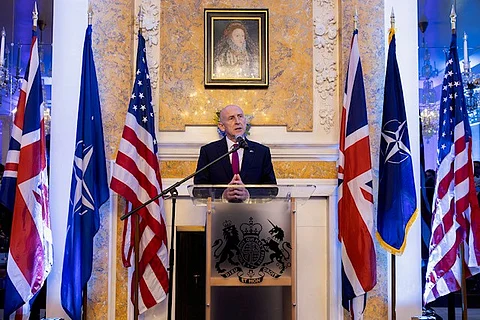

In a striking escalation of rhetoric, the United Kingdom and Australia declared on Sunday their willingness to jointly defend Taiwan in the event of a conflict with China. The statement marks a clear departure from the long-standing U.S. policy of “strategic ambiguity” on the Taiwan issue.
Speaking aboard the British aircraft carrier HMS Prince of Wales docked in Darwin, Australia, UK Defence Secretary John Healey, flanked by Australian Deputy Prime Minister and Defence Minister Richard Marles, stated that the two nations were prepared to “fight together” if hostilities broke out over Taiwan.
The comments were made during the Talisman Sabre 2025 military exercises and represented one of the strongest public declarations by a British official on the Taiwan issue. Healey’s remarks also departed from the UK’s previously measured stance, which has traditionally respected China’s claim over the island while supporting peaceful resolutions.
Following media coverage and diplomatic concern, Healey attempted to qualify his statement, saying he was speaking in “general terms” and that diplomacy remained the preferred path in managing tensions in the Indo-Pacific region. Despite this, analysts have described his comments as unusually direct and indicative of a shift in Western posture.
The timing of the statement coincides with growing unease among U.S. allies about being drawn into a potential war in the Taiwan Strait. Earlier this month, U.S. Undersecretary of Defense Elbridge Colby—known for his hawkish views on China—reportedly approached Australian and Japanese officials seeking clarity on their willingness to join the U.S. in a conflict with China. The move was seen in Canberra and Tokyo as an unsettling sign that Washington may be trying to place allied forces on the front lines while maintaining its own policy of ambiguity.
Western policy on Taiwan has shifted notably over the past several years. Under former President Joe Biden, the U.S. moved closer to explicit support for Taiwan’s defense. On several occasions, Biden stated that the U.S. would intervene militarily in the event of a Chinese attack—comments that the White House later walked back to reaffirm adherence to the One China Policy.
Biden’s tenure also saw a series of provocative actions, including then-House Speaker Nancy Pelosi’s controversial visit to Taiwan and the quiet deployment of U.S. special forces to the Kinmen Islands, located just off the coast of mainland China.
Under President Donald Trump’s administration, the U.S. has doubled down on military support for Taiwan and the Philippines. Taiwan now hosts its own battery of U.S.-supplied HIMARS rocket systems, while NEMESIS anti-ship missiles have been deployed to the Philippines. These moves are widely viewed as part of a broader U.S. strategy to contain China’s influence in the Pacific and prepare allied forces for a possible confrontation.